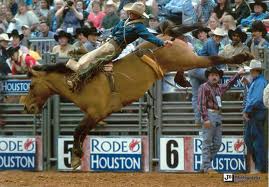The Significance of the Houston Rodeo
 It's no secret that March is the month for Texas. Starting with the Texas Declaration of Independence on March 2, the fall of the defenders of the Alamo on March 6, and one of my personal favorite times of the year: the Houston Livestock Show and Rodeo--the world's largest rodeo. All in the same week, Houston saddles up to reflect on Texas history and partake in the Houston Livestock Show, where millions of people flock to from all over the world for this one-of-a-kind Texas tradition.
It's no secret that March is the month for Texas. Starting with the Texas Declaration of Independence on March 2, the fall of the defenders of the Alamo on March 6, and one of my personal favorite times of the year: the Houston Livestock Show and Rodeo--the world's largest rodeo. All in the same week, Houston saddles up to reflect on Texas history and partake in the Houston Livestock Show, where millions of people flock to from all over the world for this one-of-a-kind Texas tradition.
Everyone knows about the Texas stereotype. When "Northeasterners'' find out I'm from Texas, often times I am asked if people ride horses around town and if cowboy boots are worn every day. The truth is, during the Rodeo season, that stereotype comes to life. You bet you'll see trial riders parading through downtown Houston. Most years, it's on Texas Avenue, the historic street built to accommodate the early longhorn cattle drives coming to town on their way to the rail station.
Fun and games set aside, there is a very rich history behind the Houston Rodeo, in particular. The tradition began in 1931 when a few men came up with a unique idea to get together and have a "Fat Stock Show.'' As strange as it might have sounded back then, the idea worked. Year after year, the show grew a little more. It used to be held in the Sam Houston Coliseum but has since been housed in different locations. I'll never forget the first year the show made its way to the Astrodome before officially landing at Reliant Park. Not to mention when the country music king, George Strait, honored and thanked the Astrodome for hosting so many years of the Houston Rodeo. He sang his famous "Cowboy Rides Away.'' Other famous artists who have performed include Elvis Presley, Roy Rogers, Gene Autry and my all-time favorite, Charlie Pride.
To think that just a handful of men made it their mission to show off their livestock and share their passion of agriculture with Texas 83 years ago is fascinating. Not knowing the fate of their simple idea, the rodeo has evolved into the world's biggest and best-known livestock exhibition, the largest regular-season rodeo, some of the best musical performers, and the city's most popular and popular occasions. Additionally, the rodeo holds everything from the world's largest barbeque cook-off to a Texas-size fair.
Each year, Houston experiences a significant economic lift. With the millions of people who travel to Houston for the rodeo, the city counts on a nice boost. Texans know how to show the tourists a good time and make themselves a pretty good living. The show itself has brought in more than $320 million in the past years and has created more than 7,000 full-time jobs. Not to brag but this is something Texans should take the utmost pride in.
The men of the Houston Rodeo are also known as the ``founding fathers.'' In 1930, they wanted to create more than just a rodeo. To put it simply, they wanted a rodeo with a purpose so they created a charitable event that contributed to the educational and scientific advancement of Texas agriculture. Throughout the history of the Rodeo, it has awarded $300 million to Texas youth in various forms, such as scholarships and educational programs. The best part is, all the work is done by several hundred generous volunteers.
As Texans put on their cowboy hats and boots, and saddle up for the rodeo, a Texas-sized thank you goes out to all of the thousands of volunteers who make the Houston Livestock Show and Rodeo a success. For those who have never been, this is like the Texas version of Mardi Gras, but with cowboy hats. And there's nothing quite like it. For Texans, it's their cultural duty to attend. Every year, they know it's a good time comin'. God bless Texas. And that's just the way it is.




Comments
Join the discussion on Facebook
Join the discussion on Facebook.